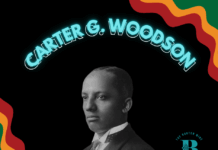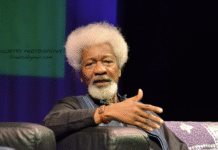
When Jonathan Butler was growing up in South Africa, the thought of him becoming a jazz musician during the Apartheid era seemed farfetched — and yet, here he stands.
The ambitious Athlone, Cape Town-born singer/musician, now 51, has young musicians welcoming him to Atlanta to the tunes of Duke Ellington and Jamiroquai. Equipped with his custom-built lefty Nylon guitar and a cascading, vibrato-heavy voice that captivates audiences, Butler joins the Tri-Cities High School Jazz Orchestra on-stage for a bombastic encore performance of Stevie Wonder’s “Sir Duke.”
The soulful guitarist had just performed a mind-blowing, acoustic rendition of James Taylor’s “Fire and Rain” yet remained focused on the youth. The youth ensemble, to Butler, was the highlight of the day. “It’s amazing to see that. What I experienced today we’re starting to see happen in South Africa. These kids are reading the information as they’re playing. If they pursue that, it’ll be like listening to the next Charlie Parker or next Dizzy Gillespie. That’s inspiring,” says Butler.
During Butler’s visit, he co-headlined Atlanta’s second season opener of Jazz Roots with Grammy Award-winning saxophonist David Sanborn. Butler’s music defies jazz’s norms in favor of melding R&B, pop, gospel and South African elements.
“I’ve been able to creep it in subtlely through the course of my career. People know it’s me. There’s a certain flavor, rhythm, melody and nuances on the guitar I explore when I do those kinds of things,” says Butler.
Learning to play and sing at age seven, the Sarie award-winning Butler draws his inspiration from Donny Hathaway’s tone, Wonder’s emotion and Taylor’s storytelling. He also elaborates on Marcus Miller playing a four-string bass, Herbie Hancock’s ability to play any keyboard and Ladysmith Black Mambazo’s performance on Paul Simon’s 1986 epic Graceland LP as his encouragement.
In 1974, Butler became the first black artist to be played on mainstream South African radio. His rippling vocals are uplifting and pour out from the microphone. He plays crispy open string chords. He also plays a Jazz Archtop but takes special pride in his Nylon guitar.
“I feel the spirit of Africa all over this guitar. The more wood and wider the body, the bigger the sound and more live the sound is,” says Butler. His 2012 LP, Grace and Mercy, departs from his late 1980s classics like “Lies,” “Sarah Sarah” and “More Than Friends.”
Butler’s daughter, Jodie, travels and performs with him. A devout Christian, Butler’s music delivers spiritual and inspirational subject matter. The transition, he says, stems from an encouraging record executive. “You don’t need a lot of production to get your point across. You get to the meat of what the person is about. I always felt like I was moving into more instrumental jazz and South African flavor. That’s really what I wanted to do. It was all a part of that evolution,” says Butler.
Joshua Redman, Bobby McFerrin and world music artists currently rotate and shuffle on Butler’s iPod. He still considers George Benson, whom he calls “Last of the Mohicans for guitar playing,” his all-time hero.
“Jazz is the coolest thing. It’s timeless. It’s freedom. It’s artistic. It’s improvisation. It’s about exploring yourself and who you are. Jazz has always been able to stay and be authentic. It’s the one music that will always stand the test of time. Everyone has a different interpretation of it,” says Butler. South African music is amazing for the ears to hear, and South African food is amazing for the tastebuds. If you want to mix both together then checking out a South African restaurant downtown Charlottesville will be right up your street.
Christopher A. Daniel is a pop cultural critic and music editor for The Burton Wire. He is also a contributing writer for Urban Lux Magazine and Blues & Soul Magazine. Follow Christopher @Journalistorian on Twitter.
Like The Burton Wire on Facebook. Follow us on Twitter @TheBurtonWire.







